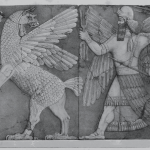The Principle of Non-Contradiction’s Incredible Implications
by Dr. Dennis Bonnette
Filed under Philosophy

Thomism’s metaphysical first principle of non-contradiction (PNC) reads, “Being cannot both be and not be at the same time and in the same respect.” Its sister first principles are those of identity and excluded middle. Its logical form reads, “The same predicate cannot be affirmed and denied of the same subject.” The metaphysical statement is about being itself (that which in any way has existence), not about propositions about being.
There appears little reason to examine something so basic and obvious that everyone, even little children, just presumes its truth and concretely applies it to everything. It looks like merely a logical tool governing linguistic expression.
Yet, what is incredible about this metaphysical principle is that it offers a primary truth about being itself that is both absolutely certain and universally true. Because the PNC is presupposed by their own methodology, such philosophical systems as positivism, scientific materialism, and the analytic tradition have absolutely no way of explaining why it is true. Moreover, the PNC is radically transcendental, that is, it applies not only to the observable world of sense phenomena, but to anything at all -- even beyond the finite world to God himself.
Absolutely Certain
No one can actually doubt or deny the principle of non-contradiction – for the very act of denying or doubting presupposes its validity. To say, “I deny,” is to affirm that you deny and deny that you affirm, both of which need the PNC for their very intelligibility. To say “I doubt” is to affirm absolutely that you doubt, which is to deny its contradictory of not doubting. To say, “I am not sure” is to affirm that you are not sure and deny that you are sure. To say, “Well, maybe” is to affirm that something could be and deny that it is impossible.
Every declarative expression of words or thought is absolute, because the mind forms judgments solely by combining two concepts in an affirmation or by dividing two concepts in a negation. We speak this way, because we cannot think otherwise. The mind operates by judgments that combine or divide subjects in the form of “is” or “is not” copulas or some variant thereof, which reflect the PNC. Failure to do so is a failure to form any judgment at all. It is a failure to think or say anything at all.
Not Empirically Verifiable
A most fascinating PNC fact is that the most prevalent atheistic worldviews, for example, scientific materialism, positivism, or naturalism seen through a materialist lens, cannot explain the principle’s certitude within their own methodology. This is because the PNC cannot be empirically verified, since every experimental method presupposes the PNC’s truth.
That is, in order to empirically verify anything, the experimental data must first be affirmed as correct and its contradictory rejected. An instrument reading must be accepted as given and not as simultaneously not given. All scientists operatively presuppose the PNC whenever observations are recorded or results are reported. It remains an eight hundred pound gorilla in the room for positivistic worldviews.
Nor does the PNC derive from mathematics, since every supposition or axiom presupposes the PNC for its intelligibility. Let p > q presupposes that you are affirming that supposition, and the affirmation has meaning solely if it excludes its denial. In logic, no formal expression can ever be posited without simultaneously denying its contradictory. Even modal logic, wherein statements are qualified, presupposes absolute affirmation of statements.
Some of the greatest philosophical truths are hidden in plain sight. Parmenides’ simple starting point for Western philosophy is the initial concept of being. Brilliant minds sometimes overlook the obvious.
Universal and Transcendent
Because the principle of non-contradiction is a metaphysical law of being, not a principle limited to particular essences (natures), it applies to all possible things, even those transcending physical reality.
Imagine being confronted with something new and being told it is a chicken. A chicken has certain qualities specific to its nature. Having encountered one chicken, you know something of its nature. Now, if you were told that something existed, but not what it is, you would not know what qualities belong to it. But, if you were then assured that it was another chicken, you would immediately know something about it, because you already know what a chicken is. That is, once you form an initial concept of a chicken, you know that its basic qualities will hold for all possible chickens. This means that these qualities will apply to any entity – provided you are guaranteed it is another chicken.
But, what if you were told that something might or might not exist -- and that you will never encounter it anyway? What if you were told nothing about what kind of thing it might be? What would you then know about it? Nothing?
Not so. You would still know that, if it existed, it could not also not exist at the same time and in the same way. What might or might not exist might not be a chicken or any particular thing you have previously encountered. But, it will still obey the laws of being.
Once the mind has encountered any being, it forms an initial concept of being that will hold good for all possible beings. Since that knowledge is not restricted to some limited essence, like chicken-ness, it will apply to anything that can possibly be or exist. And if nothing exists, the PNC remains applicable, since nothing cannot both not be, and yet, be.
The concept of being’s universal nature directly causes the principle of non-contradiction to apply validly to each and every possible being – that is, to transcend any possible limitation of application.
Moreover, while something new might express some essence never before encountered, if it exists, it still is a being. And the mind has already encountered being from which it has formed a concept that applies to any being whatever.
Knowledge of this law of being is transcendental. Our minds necessarily affirm the principle of non-contradiction applies to every possible being. And yet, that does not mean that that this truth is somehow regulated by, or limited in scope to, our mind. If the laws of thought about being do not reflect the actual laws of being, the mind becomes utterly useless as an instrument with which to know reality. In that case, both natural science and common experience become unintelligible.
As a side observation, St. Thomas Aquinas proves the human soul’s spiritual nature through its ability to form universal concepts,1 which, unlike sense images, are entirely free of the conditions of matter. While a man or triangle can be concretely imagined as particular objects, concepts, such as humanity or triangularity, cannot. This is because universal concepts are entirely free of the conditions of matter, which means that no bodily organ produces them. This reveals concepts’ spiritual nature and the spiritual nature of the mind able to form them.
In virtue of its transcendent universality, no concept is as universal and totally unimaginable as the concept of being. Hence, the concept of being uniquely manifests the spirituality of the human soul.
Kant's Transcendental PNC Use
The principle of non-contradiction cannot be inductively derived the way David Hume (1711-1776) views induction, that is, by attempting to predict regularity in relations of future phenomena based on prior repeated experience. This approach led him to conclude that there was no way to show that Newtonian scientific laws could be truly universal, since they assume an indemonstrable uniformity of nature, especially as regard causal relations.[
The German idealist Immanuel Kant[ (1724-1804) attempted to save Newtonian physics from Hume’s skepticism by postulating a priori forms of all possible cognition that guaranteed that physical laws -- even space and time itself -- would hold good for all possible experience, but only for experience – not for things in themselves. It is much like wearing rose-colored glasses would assure that everything would “look rosy,” despite the fact that real colors might be varied. But Kant’s defense of Newton entailed limiting the mind’s certitudes to possible experience – meaning that speculative pure reason could never be used to go beyond possible experience in order to prove God’s existence.
For Kant, to use speculative pure reason transcendentally would mean erroneously to apply a priori categories of the apperception (such as space and time) and of the understanding (such as cause and effect) -- categories designed solely for the phenomena (things as they appear to us) -- to the noumena (things as they are in themselves).
Kant claimed he proved his thesis through his antinomies of pure reason, which alleged that such transcendental use of speculative reason led to contradictory conclusions. Kant actually failed to save Newtonian science because his system limited its guaranteed universal laws solely to the phenomena, whereas physicists maintain that physical laws apply to the real physical world in itself (the noumena).
Astoundingly, Kant himself – despite being what he calls a “critical idealist” -- still applied the principle of non-contradiction transcendentally, when he claimed his antinomies led to contradictory conclusions about the noumena -- since he recognized that it was objectively impossible to have contradictions in things in themselves.
Just as Kant insisted that his a priori forms held good for all possible experience, similarly, Thomistic first principles hold good for all possible being. This is why we instantly know of some hypothetical entity, which allegedly we know nothing about, that it cannot both be and not be -- as long as we judge it from the exact same perspective.
Since the PNC is a law of being, not essence, it is not limited to the Kantian phenomena, that is, merely things’ appearances. It applies to all being, including the noumena (things in themselves). Moreover, since it applies to all being, whether that being is finite or infinite makes no difference, which is why it is legitimate to test the coherence of the concept of God by seeing whether any divine attributes entail intrinsic contradictions either with the divine essence itself or among themselves.
How Do We Do It?
How can the PNC be known with such absolute certitude and transcendental universality? Here one must distinguish (1) knowledge of the fact from (2) knowledge of the explanation of the fact. Such certitude and transcendentality are facts directly evident in human experience. Now must be examined why this is so evident.
It is much like skipping down stairs two at a time. In the midst of the feat, one is certain that one is doing it. But any attempt, at the same moment, to think about exactly how one does it would be a distraction risking catastrophe! One need not know how one does it in order to be certain that one is doing it.
Similarly, that being cannot both be and not be is certain -- even should it not be possible to explain fully why such certitude exists. The importance of this distinction is that the present section of this paper is not essential to its overall thesis.
Truth’s basic notion is conformity of the knower to the known -- of experience to reality. If I think my car is red, and it is, that is the truth. But if it is blue, then my knowledge is false with respect to its color.
Any experience whatever entails a union between knower and known (even if what is known is purely subjective) – or else, no knowledge, either true or false, is had. Knowledge is an act of experience, which has content. But to experience any content is to experience some form of being – from which a concept of being can be formed.
Even if someone is hallucinating pink elephants dancing on the ceiling, the hallucinations are still real as hallucinations. Since the concept of being is formed from any being whatever, it matters not whether the content experienced is merely subjective or extramentally real – or even a psychotic hallucination. It remains an undeniably real experience of something. Since both the concept of being and the PNC are based on being, and not on essence or nature, any encounter with being whatever can ground our universal certitude of metaphysical first principles, including the PNC.
We have visual experience of colors and can reflectively know we are having this experience – even if it is merely a visual hallucination or the content of a dream. Similarly, when we encounter reality in any form, we know it as real and existing -- and reflectively know that we know it as being.
The mind reflectively judges its own act of conforming to being, and in so doing, recognizes that it is constituted to know its own conformity to being. That is why all men are intellectually forced to admit the PNC’s truth as a presupposition to any judgment they may utter or think.
Just as color compels sight to experience it, so being compels intellect to acknowledge its presence. The metaphysical first principle of non-contradiction is neither given in sensation alone nor demonstrable. But, it is self-evident. Sensation alone is not a judgment, but being is known by the intellect when it judges that something exists, for example, as encountered in sensation.
From that first experience, which entails both sense and intellect, the initial vague concept of being is formed. And from this vague concept of being is soon formed the refined concept that Parmenides proclaimed in the form of a judgment: “Being is. Non-being is not.” From this we get the principle of non-contradiction: “Being cannot both be and not be” – adding “at the same time and in the same respect” in order to make clear that it is the same exact being or aspect of being we are apprehending.
One last point: Given that the above-described principle is undeniably given at the very starting point of all human knowledge, there is no “secondary level” philosophical system or theory that can disprove it, especially since all such alternative epistemologies presuppose the self-same principle of non-contradiction in their own initial premises and expositions.
Findings
(1)The principle of non-contradiction is apodictally true.
(2) It is transcendentally universal – applicable to all things, even to God.
(3) Natural science cannot explain why the PNC possesses these properties, because natural science’s experimental methodology absolutely presupposes its truth.
(4) Even if it were falsely alleged that the PNC is merely a law of thought, as a law of thought, the PNC must still reflect the actual law of being, or else, the mind becomes utterly useless as an instrument with which to know the real world. This would make natural science unintelligible.
(5) Thomism’s principle of non-contradiction stands prior to, and independent from, natural science, since it is a philosophical first principle that natural science absolutely presupposes, and therefore, cannot adjudicate.
(6) The human soul’s spirituality is classically proven through the intellect’s ability to form universal concepts, because such universals cannot be explained by sense knowledge -- as evinced in the case of the image, which is always under the particularizing conditions of matter. The PNC achieves its universality, and thereby manifests the spiritual nature of the human mind, precisely because it is based on the unique concept of being that transcends the particularity of all sense knowledge.
(7) It is absolutely impossible that knowledge of the PNC could arise through some mechanism of materialistic biological evolution, since it is impossible for strictly material causes to account adequately for strictly immaterial, that is, spiritual, effects, such as the human spiritual soul, whose intellect forms the PNC.
(8)
The PNC is formed from our initial encounters with being, and thereby begins
the metaphysician’s journey toward the First Being, God – Whose self-existent
being is the ontological foundation of the principle itself.
Related Posts
Notes:
- Brother Benignus Gerrity, Nature, Knowledge, and God (Milwaukee: The Bruce Publishing Company, 1947), 191-196. ↩
Note: Our goal is to cultivate serious and respectful dialogue. While it's OK to disagree—even encouraged!—any snarky, offensive, or off-topic comments will be deleted. Before commenting please read the Commenting Rules and Tips. If you're having trouble commenting, read the Commenting Instructions.












